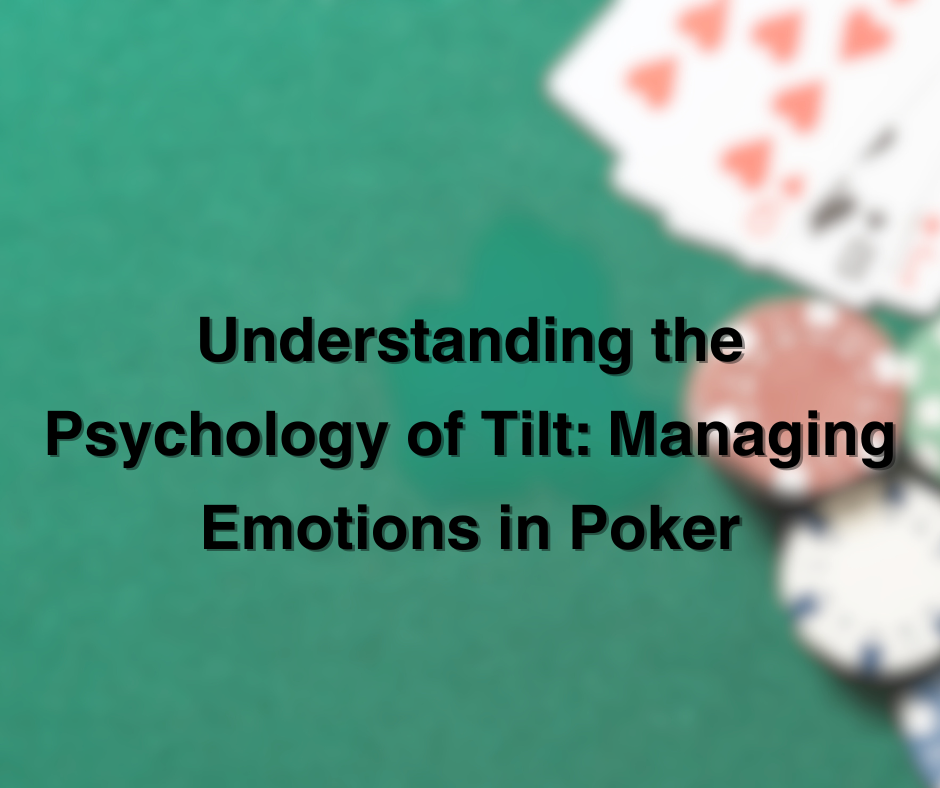
目录
切换扑克中的倾斜是什么?
In poker, tilt refers to a state of emotional or mental frustration that causes a player to play suboptimally. It often occurs after a significant loss or a series of bad beats, leading to irrational decision-making and increased aggression.
倾斜如何影响扑克玩家?
Tilt can have a profound impact on poker players, both psychologically and financially. It impairs judgment, leads to impulsive decisions, and causes unnecessary risks. This emotional state often creates a vicious cycle—losses lead to tilt, which leads to more poor decisions and further losses. Whether you’re just starting to play poker online or are a seasoned pro, recognizing and overcoming tilt is key to long-term success.
倾斜的常见诱因有哪些?
Several factors can trigger tilt in poker players. Losing a significant hand, experiencing a series of bad beats, or encountering an obnoxious opponent can all contribute to tilt. Additionally, external
factors such as fatigue, stress, or distractions can exacerbate tilt and make it harder to control.
If you’re struggling with repeated losses, our guide on how to handle losing streaks without going on tilt offers practical tips to stay composed.
玩家如何识别倾斜?
识别倾斜对于扑克玩家减轻其影响至关重要。倾斜的迹象可能包括心率加快、出汗、呼吸浅和情绪反应增强。玩家还应该注意决策过程中的变化,例如冲动投注或偏离战略游戏计划。
管理倾斜的策略
Managing tilt requires a combination of self-awareness and discipline. One strategy is to take a break from the game to regain composure and refocus. Deep breathing exercises or meditation can help calm the mind and reduce stress. Setting limits on the amount of money or time spent playing can also prevent tilt from escalating.
If you’re playing with new poker rules in 2025, understanding rule changes can reduce the stress and surprises that trigger emotional reactions.
培养情绪弹性
Building emotional resilience is essential for poker players to cope with the ups and downs of the game. This involves accepting that variance is inherent in poker and focusing on long-term results rather than short-term outcomes. Seeking support from peers or a mentor can provide valuable perspective and encouragement during challenging times.
or beginners and pros alike, coping with swings in the game is crucial. Our article on losing streaks and tilt dives deeper into this mindset.
心态在扑克中的作用
Mindset plays a significant role in how players approach tilt. Adopting a growth mindset, which
emphasizes learning and improvement, can help players bounce back from setbacks and maintain a positive attitude. Avoiding negative self-talk and reframing losses as opportunities for growth can also bolster mental resilience.
Players who start playing poker online with a focus on mindset tend to grow faster and tilt less often.
在餐桌上培养正念
寻求专业帮助
对于某些玩家来说,管理倾斜可能需要专业帮助。接受过认知行为疗法 (CBT) 培训的治疗师或咨询师可以帮助个人识别和解决导致倾斜的潜在心理问题。他们还可以教授应对策略并提供持续的支持,以帮助玩家更有效地管理自己的情绪。
建立一个支持性的扑克社区
克服扑克倾斜的策略:综合指南
识别倾斜的触发因素
Bad Beats: Experiencing a string of unlucky hands or losing a significant pot can trigger feelings of frustration and anger.
Obnoxious Opponents: Dealing with rude or disrespectful opponents can disrupt focus and exacerbate tilt.
Fatigue and Stress: Physical and mental exhaustion can impair judgment and make it harder to control emotions.
Distractions: External distractions, such as noise or interruptions, can disrupt concentration and increase susceptibility to tilt.
培养情绪弹性
Emotional regulation is the bedrock of sound poker decision‑making. When anger, fear, or frustration seep in, they cloud judgment and distort risk assessment. Research shows that negative emotions like moral anger significantly reduce mathematical accuracy in poker decisions, particularly when players feel socially watched.
Maintaining a calm, analytical mindset—even after bad beats—preserves your ability to evaluate pot odds and ranges objectively.
在餐桌上培养正念
Practicing mindfulness can help poker players stay grounded and focused during gameplay. Techniques such as:
Visualization: Visualizing successful outcomes and staying focused on the present moment can enhance concentration and prevent tilt.
Body Scanning: Paying attention to bodily sensations can help players stay attuned to their emotions and reactions, enabling them to make more rational decisions.
Sensory Awareness: Staying mindful of sensory experiences, such as the feel of the cards or the sounds of the chips, can enhance presence and prevent distractions.
实施自我监管策略
自我调节对于管理倾斜和保持餐桌上的镇定至关重要。主要的自我调节策略包括:
Taking Breaks: Stepping away from the game when emotions run high can provide valuable time to regroup and refocus.
Deep Breathing: Engaging in deep breathing exercises can help calm the nervous system and reduce stress levels.
Setting Limits: Setting limits on the amount of time or money spent playing can prevent tilt from escalating and protect bankroll management.
最后的想法:虚张声势的猴子对倾斜的看法
Tilt in poker isn’t just about losing—it’s about how you respond to loss. From identifying triggers to managing emotions and seeking support, tilt is a challenge that every player must face.
At Bluffing Monkeys, we’re here to help you sharpen your game, stay composed under pressure, and make smarter plays with every hand.
